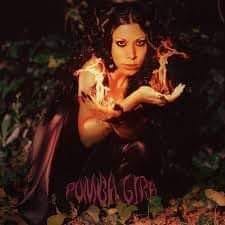
Pomba Gira (pronounced pohm-ba shira), is Brazilian female spirit found in the traditions of Umbanda, Quimbanda, and Candomblé. She is revered by initiates and noninitiates alike as she is quite easy to relate to. Her imagery in her many manifestations is related to urban or street life and the everyday animal instincts and desires of people (vices, lust, indulgences, etc). She is very human, with concerns of the flesh and material nature, and shares in our human weaknesses. Pomba Gira, as well as the many exus, are often considered amoral because they will fight the fight of justice and will destroy enemies without concern for morality and do so with complete and utter self-service in mind. This is one reason why she is considered dangerous to work with because she is called upon by people of varying moralities. The person who works with her can energize her dangerous nature or her helpful nature, depending on how she is petitioned.
To work with Pomba Gira involves a ritual called a trabajo. This ritual is similar to the trabajo of the exus, with some specific differences. All trabajos, like any ritual, include a specific intent, a specific location (usually a female crossroads) and specific offerings. Some other magickal correspondences are as follows:
Food: honey, flour, palm oil
Drink: anisette or champagne
Color: red and black
Place: female crossroads
Scent:Red roses, cigarillos
Time: Midnight
Day: Monday or Friday
Container: metal or clay vase
Pomba Gira is often called the Sacred Whore. She was originally thought to be a Kongo deity unique to Brazil. Some say she is the wife of Exu and shares many of his characteristics. Some say she is a separate Orisha and a female path of Exu. She is a powerful protectress and is often called “the last chance”. She will help you when you are desperate, down on your luck and no other Spirit will cooperate. She is very powerful and very dangerous. She always gets paid in advance and nonpayment will bring great suffering to those who cross her. She is always willing to sell you what you need for the right price positive or negative. She works fast and to the point so it’s always a good idea to be very sure of what you ask for.
pomba gira spell for quick money
You will need :
1 red tea light
1 pack of long white cigarettes
1 box of matches
3 red roses
1 bottle of Gin { airline bottles work well for this}
1 piece of pink paper
1 piece of red fabric
Write out your petition on the pink paper. Be sure to be specific about the amount of money you need and what you need it for. Fold the paper 3 times. Lay the petition on your altar. Lay the roses on the paper.
Light the red tea light. Open the matches and make sure 3 are sticking out of the box. Open the cigarettes and pull 3 half way out of the pack and lay them next to the matches. Open the Gin and place next to the roses. Ask Pomba Gira for help. Let the tea light burn out. Take everything wrapped in the red fabric to a T road or crossroad. Thank Pomba Gira for her help.
A significant study on the cult of Pomba Gira, this is the most comprehensive work in the English language on the Devil’s mistress, whose Brazilian cult has bewitched so many. It is a book that those seeking congress with the current of strong female magical sexuality have long desired. A beguiling spirit, Pomba Gira gives solace to the broken hearted, vengeance for the wronged, and a fierce path for those that would take her as muse. In Pomba Gira Frisvold gives explicit workings, baths and waters, her songs and chants. Her plant allies among the nightshades are described in a full herbarium. The attractions and dangers for both men and women who make cult to her are presented, as are her many faces. Pomba Gira has origins in the witchcraft of Portugal, the Basque Country as well as Congo and the native influences of Brazil. The witchcraft fusion makes her cult particularly accessible to Westerners whose own traditions share much ground with Quimbanda. Frisvold carefully unravels the skeins, revealing her origin in historical figures such as Maria Padilha, but more deeply still through archetype and myth to the very essence of her skin shedding nature. He finds the origin of her name in Congo, the cult of divine possession amongst the slave camps of Brazil, and brings us through to her more modern manifestations and his personal work with the Queen of the Fig Tree in Hell. As an initiate and devotee, he gives an insider’s view with the same respect and experience he demonstrates in Palo Mayombe: The Garden of Blood and Bones. We walk through the Queendoms of Lyre, Cemetery, Sepulchres, Streets, Crossroads, Wilderness, Soul, Oceanshore and Calunga. The workings of twenty four different Pomba Giras are given, from Cigana the gypsy to the split skull face of Rosa Caveira. Through the razor blades in honey, the cigarette smoke and the sweet anisette spilt in the graveyard, Pomba Gira takes seductive shape.







